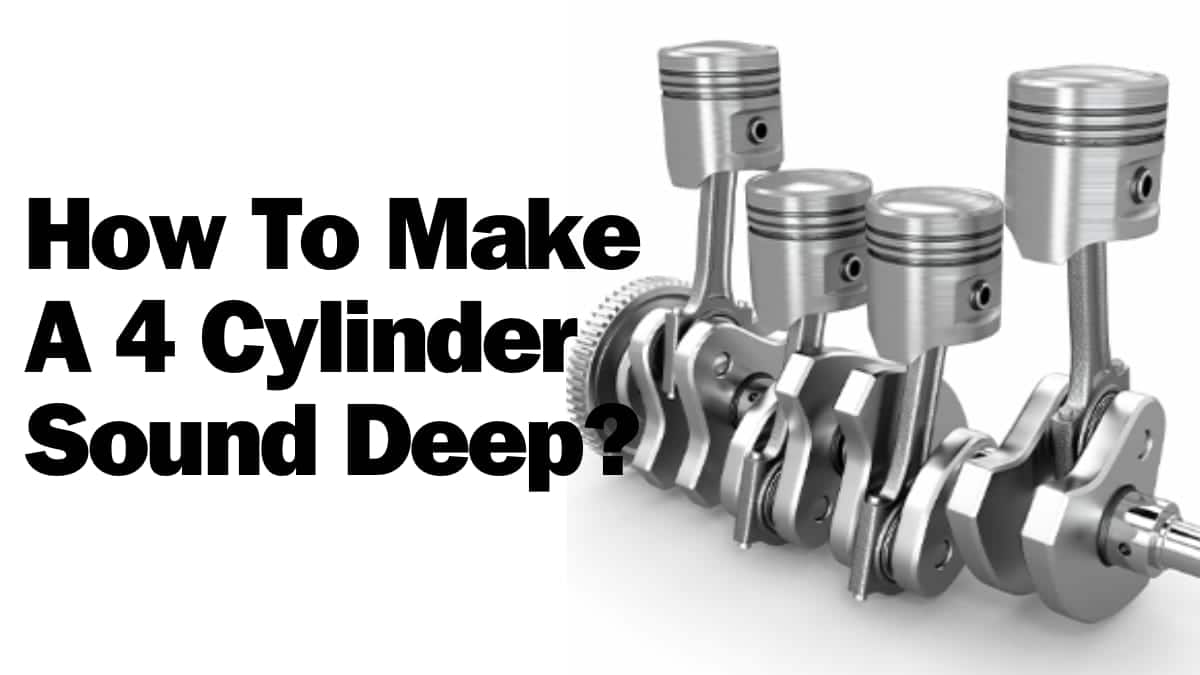Hi there, today I will guide you: How to make a 4 cylinder sound deep? Also I answer some questions like how to make a 4 cylinder sound deep? Are 4-cylinder engines noisy? And more.
How To Make A 4 Cylinder Sound Deep? Step By Step Guide

While it’s challenging to completely alter the fundamental sound of a 4-cylinder engine to mimic a V8, there are steps you can take to enhance its tone and make it sound deeper and more aggressive. Here’s a step-by-step guide:
Step-1. Upgrade the Exhaust System: Replace the stock exhaust system with a performance exhaust designed to enhance the engine’s sound. Look for exhaust systems with larger diameter piping and free-flowing mufflers to allow for better airflow and a deeper tone.
Step-2. Install a Performance Header: Upgrading to performance headers can help improve exhaust flow from the engine, resulting in a more aggressive sound. Headers with equal-length tubing are known to enhance the exhaust note.
Step-3. Add a Resonator or Muffler Delete: Consider adding a resonator or removing the muffler altogether for a louder and deeper sound. However, be mindful of local noise regulations and ensure the modifications are street legal.
Step-4. Install a Cold Air Intake: A cold air intake can improve engine airflow, which can lead to a slightly deeper and more pronounced engine sound, especially at higher RPMs.
Step-5. Tune the Engine: Opt for an engine tune or performance chip to optimize the engine’s performance. A well-tuned engine can produce a more aggressive exhaust note.
Step-6. Consider Sound Enhancement Devices: There are electronic devices available that can manipulate the exhaust sound by playing pre-recorded engine notes through speakers. While not everyone’s cup of tea, they can help simulate a deeper exhaust note.
Step-7. Professional Tuning: Consult with a professional tuner or mechanic who specializes in exhaust modifications. They can provide personalized recommendations based on your specific vehicle and preferences.
Step-8. Sound Deadening Removal: Removing excess sound deadening material from the vehicle’s interior can allow more of the engine’s sound to permeate into the cabin, giving the impression of a deeper exhaust note.
Step-9. Drive Aggressively: How you drive can also affect how your engine sounds. Driving at higher RPMs or under heavier load conditions can make your engine sound more aggressive.
How To Increase Horsepower In A 4 Cylinder Car? 2024 Guide
Is it possible to make a 4 cylinder sound like a V8?
While it’s difficult to completely replicate the sound of a V8 engine with a 4-cylinder, you can enhance the exhaust note to make it deeper and more aggressive. Upgrading the exhaust system, adding performance headers, tuning the engine, and removing sound deadening materials can help achieve a more V8-like sound. However, it’s important to manage expectations as a 4-cylinder engine will still have its distinct characteristics.
Are 4-cylinder engines noisy?
Generally, 4-cylinder engines are known for being more fuel-efficient and quieter compared to larger engines like V8s.
How To Put Head Gasket Sealer In Car? Step By Step Guide
Is a 4-cylinder louder than a 6 cylinder?
In general, a 4-cylinder engine tends to be louder than a 6-cylinder engine due to the higher RPMs needed to produce similar power outputs. However, there can be variations based on factors like engine design, exhaust system, and sound insulation.
How can I make my 4 cylinder stronger?
To make your 4-cylinder engine stronger, focus on enhancing its performance through several methods:
- Engine Tuning: Opt for a professional engine tune or install a performance chip to optimize fuel delivery, ignition timing, and other engine parameters for increased power output.
- Intake and Exhaust Upgrades: Install a cold air intake and upgrade the exhaust system to improve airflow into and out of the engine, resulting in enhanced performance.
- Forced Induction: Consider adding a turbocharger or supercharger to increase air intake pressure, allowing the engine to produce more power. Ensure proper supporting modifications and tuning for reliability.
- Internal Engine Modifications: Upgrade internal components such as pistons, rods, and camshafts to handle higher power levels and improve engine efficiency.
- Transmission Upgrades: Upgrade to a performance-oriented transmission or install a stronger clutch to handle the increased power and torque output of the engine.
- Suspension and Chassis Enhancements: Improve handling and traction by upgrading suspension components, tires, and brakes to effectively utilize the increased power of the engine.
- Regular Maintenance: Maintain the engine regularly, including oil changes, spark plug replacements, and other necessary maintenance tasks to ensure optimal performance and longevity.
[Thanks for Reading]

